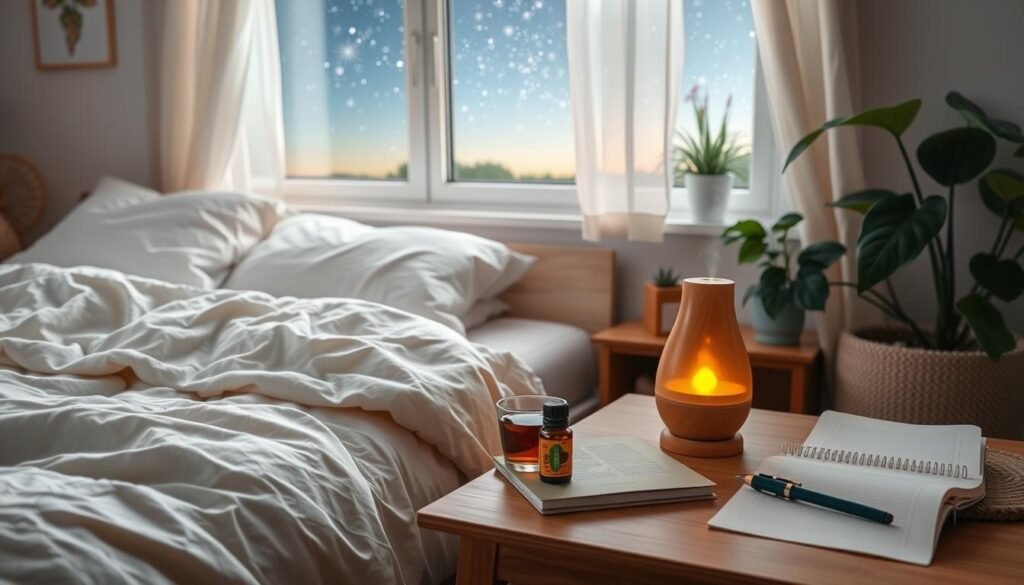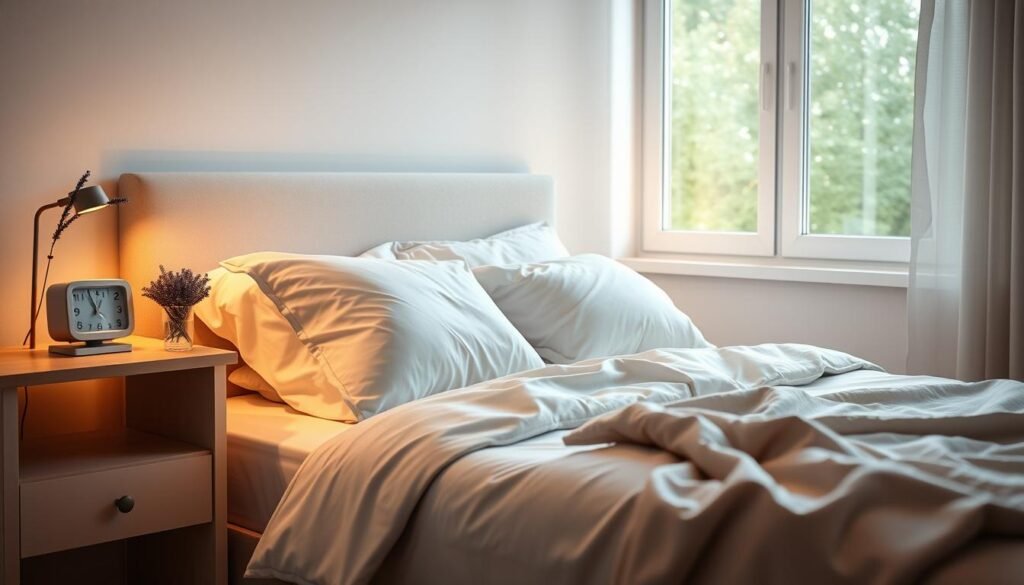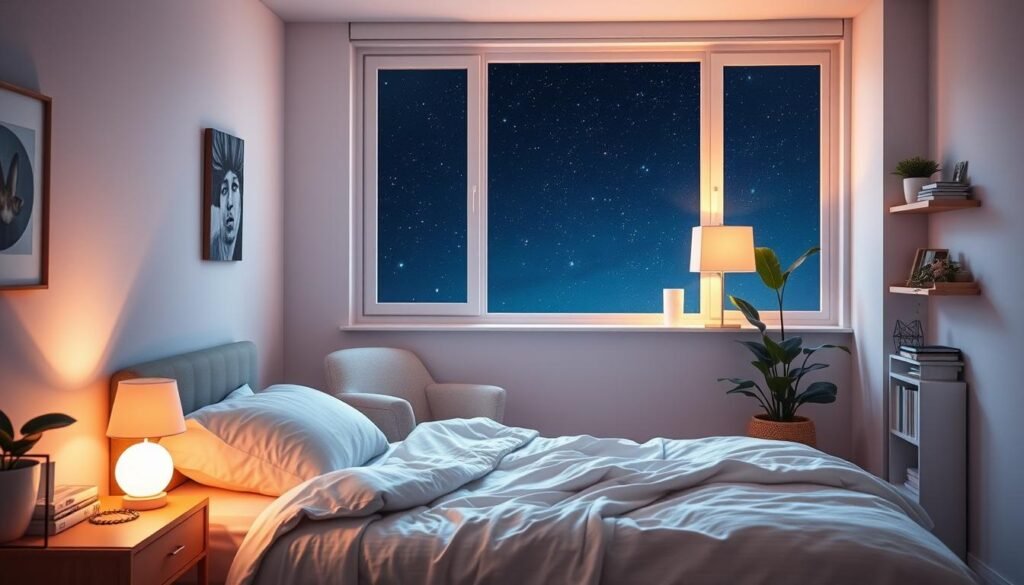It may surprise you, but 35% to 42% of people who have had a stroke suffer from insomnia. This is especially true right after the stroke. Good sleep is very important for recovery. However, many who have had a stroke struggle with sleep issues. These problems can slow down their healing and affect their overall health. Studies show that sleep issues are more common in stroke survivors than others. This highlights the need to solve these sleep problems quickly. Effective treatments for post-stroke insomnia include changing behaviors, non-drug therapies, and making changes to the environment. These can greatly improve sleep. It is vital to understand how sleep problems and stroke recovery affect each other. This knowledge can improve the lives of those affected.
Key Takeaways
- Over one-third of stroke survivors may experience insomnia for years.
- Effective treatment options for post-stroke sleep issues exist.
- Behavioral changes and environmental adjustments can improve sleep quality.
- Sleep quality significantly impacts recovery and mental health.
- Interventions like Cognitive Behavioral Therapy can aid in managing insomnia.
Understanding Sleep Disorders Post Stroke
Many people have trouble sleeping after a stroke. This can really slow down their healing. They might deal with insomnia, trouble breathing while asleep, and messed-up sleep patterns. Up to 70% of patients right after a stroke face these issues. Knowing how to handle these sleep problems is important.
Common Sleep Problems After Stroke
After a stroke, many survivors say they have trouble sleeping. Here’s what they often face:
- Insomnia, hitting about 35% to 42% of those recovering.
- Obstructive sleep apnea (OSA), found in 25% to 66% of survivors.
- Restless leg syndrome (RLS), affecting 10% to 13% of patients.
- Periodic limb movement disorder, troubling 27% to 42% of people.
These issues can mess up how well and how long people sleep. That makes getting better even harder.
The Impact of Sleep Disorders on Recovery
Bad sleep makes other health problems worse. It can make you more tired, harm your thinking, and make you feel very down. When people don’t get enough non-REM sleep or their sleep patterns are off, it’s often because of the stroke’s damage. If you have trouble breathing while asleep, you might be more likely to have another stroke. This can also make it harder to get back on your feet.
To fight these sleep problems, it’s smart to keep a regular bedtime and get help. Websites like Stroke.org offer great advice. This can really help with recovery after a stroke.
Insomnia and Its Effects on Stroke Survivors
Insomnia is a big problem for many who’ve had a stroke. It affects their body and mind. People may find it hard to fall asleep, keep waking up, or wake up too early. This can make them tired and sleepy during the day. About 41% of stroke or mini-stroke survivors face insomnia right after the event. Nearly 36% still have sleep issues more than three months later. Knowing about insomnia and how it impacts life is key to helping them.
Types of Insomnia Experienced
There are two kinds of insomnia that stroke survivors might face. Short-term insomnia comes right after the stroke because of stress and shock. Chronic insomnia can last for months or years after the stroke. Up to 67% of those who’ve had a stroke suffer from ongoing sleep problems. Around 48% deal with insomnia. People with strokes on the right side of the brain often sleep worse and take longer to fall asleep than others.
How Insomnia Affects Daily Life
Insomnia impacts stroke survivors in many ways. It can make them feel more tired, irritable, and struggle with thinking clearly. This hurts their quality of life. About 30-69% of these patients deal with a lot of daytime tiredness. This makes rehab and daily tasks harder. Not getting enough good sleep could also raise the chance of having another stroke. It might even increase the risk of dying. Finding good ways to manage insomnia is critical for their health and recovery.
| Type of Insomnia | Duration | Prevalence among Stroke Survivors |
|---|---|---|
| Short-Term Insomnia | Up to 3 months | 41% |
| Chronic Insomnia | More than 3 months | 34-67% |
| Overall Insomnia | Varied | 48% |
Understanding different kinds of insomnia and their impacts is essential. This helps in finding better treatment options. For more info on sleep issues after a stroke, check out this resource.
Post Stroke Insomnia Treatment Options
Dealing with post stroke insomnia involves a detailed plan. Both medication and other therapies are key to help stroke survivors. Crafting a mixed treatment strategy can be very effective.
Medication Approaches
Medication is a major part of treating post stroke insomnia. Drugs like mianserin and zolpidem can help with sleep. They are good because they don’t usually affect thinking skills, important during recovery. Doctors, though, must carefully choose these for each patient. They make sure the benefits are higher than the risks.
Non-Pharmacological Therapies
Non-drug treatments are also powerful against post stroke insomnia. Cognitive-behavioral therapy (CBT) is a top choice for ongoing sleep issues. It works by changing the thoughts and actions that disrupt sleep. This makes for lasting improvement. Acupuncture is another option showing good results. It often works better for sleep than placebo treatments. Using these treatments with medication can lead to better sleep after a stroke.
Managing Insomnia After Stroke
To manage insomnia after a stroke, it’s key to combine behavior and environment changes. This mix can really help improve sleep and well-being for those who have had a stroke.
Behavioral Modifications
Behavioral changes play a big role in tackling insomnia post-stroke. These include:
- Keeping a regular sleep schedule by sleeping and waking up at the same times each day.
- Staying active, which helps make it easier to fall asleep.
- Creating a calm bedtime routine, like reading or relaxation exercises, to prepare for sleep.
These steps do more than just improve sleep. They also help with overcoming post-stroke challenges.
Environmental Adjustments for Better Sleep
Making the right environment changes can help a lot with insomnia after a stroke. Things to try:
- Use blackout curtains or eye masks to keep the bedroom dark.
- Reduce noise with earplugs or white noise machines for a quieter sleep setting.
- Keep the bedroom at a cozy temperature to avoid sleep disruption.
These changes can make a big difference in reducing insomnia symptoms and helping you sleep better.

| Strategy | Description |
|---|---|
| Sleep Schedule | Consistent bedtime and wake time |
| Physical Activity | Regular exercise to enhance sleep quality |
| Bedtime Routine | Relaxing activities before sleeping |
| Dark Environment | Blocking light with curtains or masks |
| Noise Reduction | Using earplugs or white noise for quiet |
| Comfortable Temperature | Adjusting room temperature for optimal sleep |
Non-Drug Therapies for Post-Stroke Insomnia
Recovering from a stroke can be challenging, and insomnia makes it harder. This is why many people look into therapies that don’t involve drugs. Cognitive Behavioral Therapy (CBT) and acupuncture stand out. They improve sleep with no medication side effects.
Cognitive Behavioral Therapy (CBT)
CBT is a major method for treating insomnia, including after a stroke. It works by changing the thoughts and actions that mess up sleep. Many have found better sleep quality through CBT, feeling more normal every day. Finding a good therapist is key to customize CBT to each person’s needs.
Acupuncture and Its Benefits
Acupuncture is a great option for post-stroke insomnia too. It’s been shown to make sleep better and ease insomnia symptoms. A big study reported that acupuncture really helped stroke patients sleep. It may work by triggering certain body points, bringing back balance and easing insomnia troubles.
Looking into non-drug therapies offers hope to stroke survivors for better sleep and health. These methods not only fight insomnia but also improve life overall. They stress the value of treating the whole person. For more tips on non-drug treatments, here’s a useful resource.
Sleep Hygiene Tips for Stroke Patients
For stroke patients, good sleep hygiene is key to better sleep and faster recovery. A good sleep environment and a steady sleep routine are important. They help solve sleep problems like insomnia and sleep apnea.
Creating a Sleep-Conducive Environment
There are several things stroke patients should do to improve their sleep environment:
- Darkness: Keeping the bedroom dark tells the brain it’s sleep time.
- Quietness: Less noise means better sleep. Earplugs or white noise machines are helpful.
- Comfortable Temperature: A cool room is best for sleeping.

Establishing a Consistent Sleep Routine
A regular sleep schedule helps stroke patients a lot. Here are key practices:
- Regular Sleep Times: Going to bed and waking up at the same time every day keeps your internal clock set.
- Pre-Sleep Rituals: Calming activities before bed, like reading or meditating, get the mind ready for sleep.
- Limiting Naps: Naps are okay, but too much daytime sleep can hurt night sleep.
By following these sleep hygiene tips, stroke patients can address common sleep challenges. This will help improve their health and recovery.
Sleep-Related Breathing Disorders and Stroke
Sleep-related breathing disorders increase the risk of stroke. One common type is obstructive sleep apnea. It disturbs sleep by causing loud snoring, gasping, or choking. Sleep apnea’s link with stroke underlines the need for effective treatment. Knowing more about these disorders helps with recovery and overall health.
Understanding Obstructive Sleep Apnea
Many stroke survivors suffer from obstructive sleep apnea. It badly affects their sleep and recovery. The condition stops breathing briefly, raising blood pressure and stressing the heart. Unfortunately, patients often don’t realize they have this problem. This can slow their recovery. Managing sleep apnea well can reduce these risks significantly.
Treatments for Sleep Apnea in Stroke Survivors
Treating sleep apnea is key for stroke survivors’ recovery. Some common treatments are:
- Continuous Positive Airway Pressure (CPAP) therapy: This keeps airways open during sleep, improving sleep quality.
- Weight management: Keeping a healthy weight can lessen sleep apnea symptoms.
- Dental appliances: These devices also help to keep the airways open at night.
- Bright light therapy and melatonin: These can help fix sleep-wake cycles.
Effective sleep apnea management lowers the risk of more heart problems after a stroke. Thus, these treatments are crucial for thorough recovery from post-stroke insomnia. For more on how sleep disorders affect heart health, read this in-depth study.
Improving Sleep Quality After Stroke
Getting better sleep after a stroke is key for healing and feeling well. Doing things during the day can really affect how stroke survivors sleep at night. It’s important to exercise and get lots of sunshine to develop a good sleep routine.
The Role of Daytime Activity and Light Exposure
Being active in the day fights tiredness and helps you relax at night. Exercise makes muscles strong, boosts mood, and lowers stress. This all leads to a better sleep after a stroke. Sunlight tells your body when to be awake and when to sleep.
It’s good to do at least 30 minutes of exercise every day. Also, being outside helps get more sunlight. Both are essential for stroke survivors.
Nutrition’s Impact on Sleep
Nutrition is very important for sleep quality after a stroke. Eating foods with fiber, healthy fats, and proteins is good for health. Avoiding caffeine later in the day helps too.
Having regular meal times sets your body’s clock. This helps you know when it’s time to sleep. Light meals at night prevent feeling uncomfortable in bed. Making smart food choices can improve sleep and recovery from a stroke.

Seeking Help from Healthcare Professionals
Stroke survivors should not wait to ask for help with sleep problems. It’s key to talk openly with doctors about sleep troubles. This starts the process of making a sleep plan that suits the person.
Telling doctors clearly about sleep issues helps improve insomnia. This leads to better sleep and overall recovery.
Importance of Communication with Doctors
Talking about sleep habits helps doctors care for patients better. Before visits, patients should track their sleep. Changes in behavior, mood, or health should be noted too.
Talking with doctors helps create joint plans to improve sleep. Adding treatments like medications or therapy can also help a lot.
When to Seek Professional Assistance
It’s important to know when to get help. If insomnia happens three times a week for three months, it’s time to see someone. Stroke survivors with anxiety or depression should also seek help. These issues can make sleep worse.
In the U.S., 40 million people deal with insomnia each year. Getting expert advice is key for recovery.
| Symptoms Indicating Need for Help | Action Steps |
|---|---|
| Persistent insomnia affecting daily life | Document sleep patterns and seek professional advice |
| Signs of depression or anxiety | Consult a mental health professional for therapy options |
| Difficulty managing sleep despite trying remedies | Request a full assessment from a healthcare provider |
| Unexplained fatigue or sleepiness | Discuss symptoms in detail with a doctor for further evaluation |
Conclusion
Post-stroke insomnia is a big problem for many survivors. Studies show that 68% of patients have insomnia symptoms when they first arrive. This shows how important sleep is for recovery. Yet, after 18 months, only 49% still report insomnia issues. This means the right treatment for insomnia after a stroke can really help over time.
Insomnia can also make other conditions worse, like depression. Symptoms often start about two months after the stroke. Knowing the factors, such as age and if someone lives alone, helps caregivers. They can find better ways to help stroke survivors sleep better and improve their well-being.
There are different ways to treat insomnia, like cognitive behavioral therapy and acupuncture. One treatment, called Mianserin, works really well for quick relief from insomnia symptoms. By exploring these options, stroke survivors can start to get better sleep. Better sleep helps with a faster and smoother recovery process.